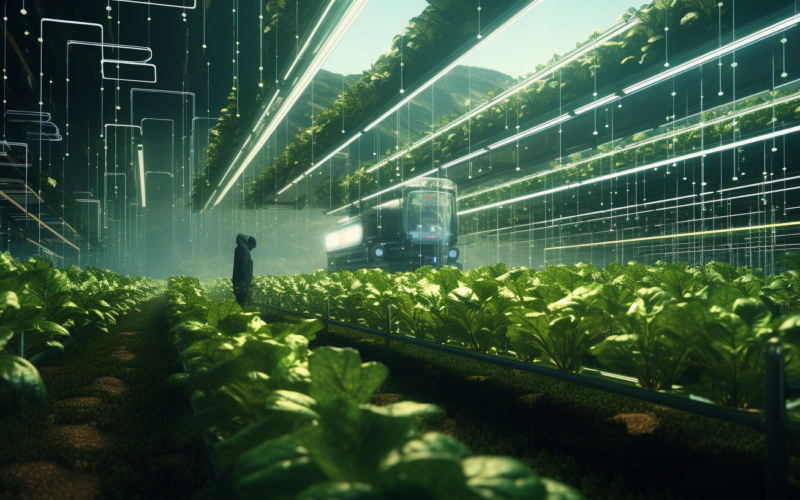Artificial Intelligence (AI) has become a game-changer in various industries, and agriculture is no exception. As the demand for sustainable and efficient food production grows, farmers are turning to AI to optimize their practices. In the realm of vegetable growing, AI has the potential to revolutionize the way crops are cultivated, monitored, and harvested. In this article, we will explore how AI could help vegetable growers enhance their operations, improve yields, and contribute to a more sustainable future. Let’s delve into the exciting possibilities that AI brings to the world of vegetable farming.
Enhanced Crop Monitoring and Disease Detection
One of the key advantages of AI in vegetable growing is its ability to monitor crops with unprecedented precision. AI-powered systems can analyze vast amounts of data collected from sensors, drones, and satellites to provide real-time insights into plant health, growth patterns, and environmental conditions. By leveraging machine learning algorithms, AI can detect early signs of disease, nutrient deficiencies, or pest infestations that may be invisible to the human eye. This enables farmers to take proactive measures to prevent crop loss, optimize resource allocation, and minimize the use of harmful pesticides.
Optimized Resource Management
AI can play a vital role in optimizing resource management, a critical aspect of sustainable vegetable growing. By integrating AI-powered systems, farmers can make data-driven decisions to efficiently manage water, energy, and fertilizer usage. For example, AI algorithms can analyze weather patterns, soil moisture levels, and crop requirements to determine optimal irrigation schedules, reducing water waste and promoting water conservation. Similarly, AI can optimize the application of fertilizers and pesticides, ensuring that only necessary amounts are used, reducing environmental impact and minimizing costs.
Precision Agriculture and Automated Tasks
AI technology enables the automation of various tasks in vegetable growing, streamlining operations and improving efficiency. Robots equipped with AI capabilities can perform repetitive tasks such as planting, weeding, and harvesting with precision and accuracy. These robots use computer vision systems to identify ripe vegetables, apply gentle harvesting techniques, and minimize damage to the crops. By automating labor-intensive tasks, farmers can save time and reduce dependency on manual labor, leading to increased productivity and cost savings.
Crop Yield Prediction and Market Analysis
AI can help vegetable growers make informed decisions about crop planning and market trends. By analyzing historical data, market fluctuations, and consumer preferences, AI algorithms can provide accurate predictions of crop yields and demand. This information enables farmers to optimize planting schedules, adjust crop varieties, and align production with market needs. By aligning supply with demand, farmers can reduce waste, maximize profitability, and contribute to a more sustainable food system.
Smart Greenhouse Systems
AI can transform traditional greenhouses into smart and highly efficient systems. By integrating AI algorithms with environmental sensors, smart greenhouse systems can autonomously regulate temperature, humidity, light, and CO2 levels. This optimization creates an ideal environment for vegetable growth, regardless of external weather conditions. AI-powered systems can analyze real-time data, adapt parameters, and make adjustments to ensure optimal conditions for plant growth. This level of precision control can result in higher crop yields, reduced energy consumption, and increased resource efficiency.
Challenges and Considerations
While the potential of AI in vegetable growing is immense, there are a few challenges that need to be addressed. Data collection and integration can be a complex task, as it requires seamless connectivity between various sensors, drones, and AI systems. Additionally, the cost of implementing AI technology may pose a barrier for smaller-scale vegetable growers. However, as technology advances and becomes more accessible, these challenges are likely to diminish, opening doors for widespread adoption of AI in agriculture.
Conclusion
AI holds tremendous promise for vegetable growers, offering solutions to enhance efficiency, optimize resource management, and contribute to sustainable farming practices. From crop monitoring and disease detection to precision agriculture and market analysis, AI can revolutionize the way vegetables are grown, monitored, and harvested. By leveraging AI technologies, farmers can make data-driven decisions, automate tasks, and maximize yields while minimizing environmental impact. As AI continues to evolve, it will play an increasingly vital role in the future of vegetable growing, ensuring the production of nutritious, sustainable, and high-quality crops for a growing global population. Embracing AI in vegetable farming is a step towards a more efficient, resilient, and environmentally friendly agriculture sector.
